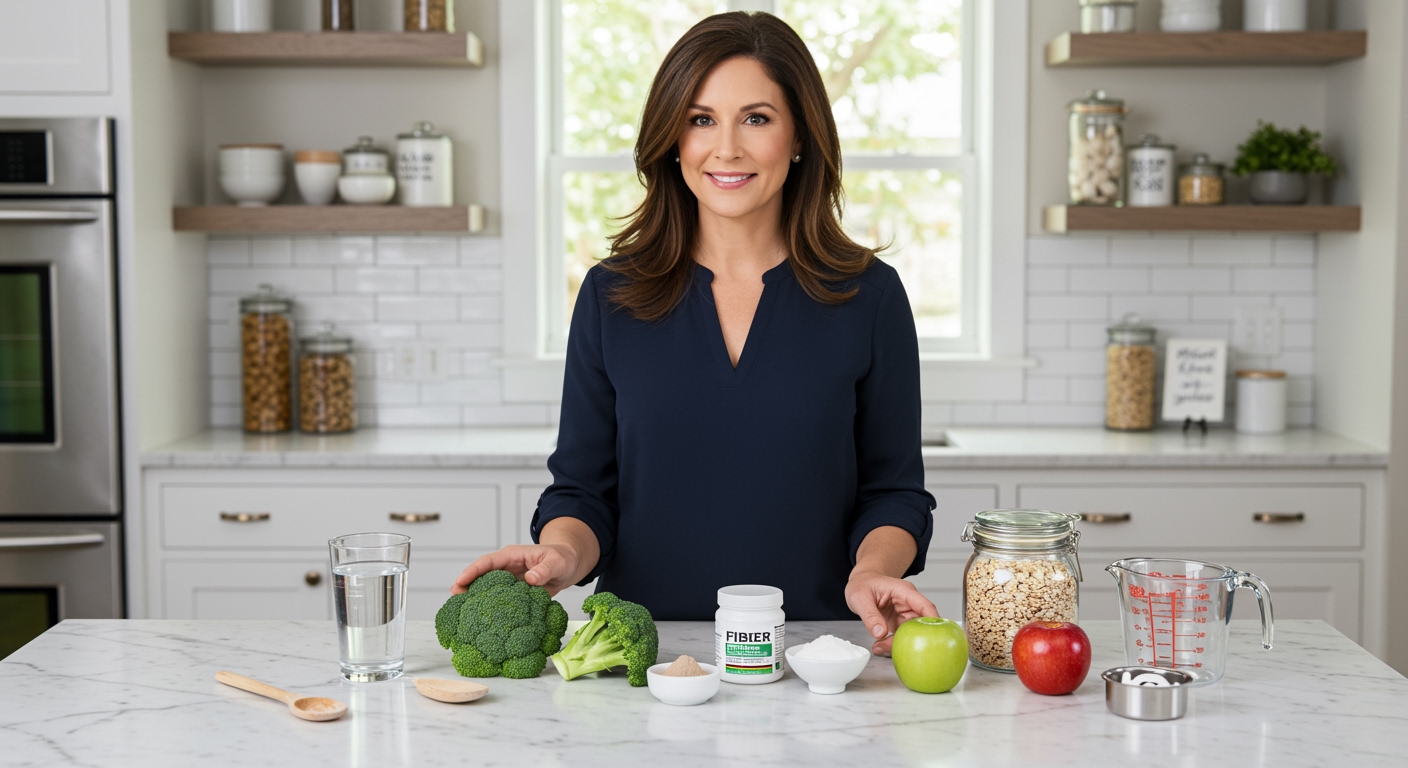✪ Key Takeaway: Fiber supplements can help PCOS by improving insulin sensitivity, reducing inflammation, and supporting hormone balance.
Introduction
You take another supplement promising to fix your PCOS symptoms, but nothing seems to work long-term.
Maybe you are wondering if something as simple as fiber supplements could actually make a difference when expensive hormone balancers have failed you.
Hi, I am Abdur, your nutrition coach, and today I am going to explain exactly how fiber supplements can become your most powerful tool for managing PCOS symptoms naturally.
How Does Fiber Actually Work For PCOS?
Fiber works like a metabolic reset button for women with PCOS by targeting the root cause of most symptoms.
When you consume fiber, it slows down glucose absorption in your small intestine, preventing those dangerous blood sugar spikes that trigger excess insulin production.
High insulin levels tell your ovaries to produce more androgens like testosterone, which creates the hormonal chaos you experience with PCOS.
Soluble fiber forms a gel-like substance in your digestive tract that acts like a protective barrier around carbohydrates.
This barrier forces your body to break down and absorb sugars much more slowly, keeping your insulin response steady and controlled.
Research shows that women with PCOS who increase their fiber intake see significant improvements in insulin sensitivity within just 8-12 weeks.
✪ Pro Tip: Take fiber supplements 30 minutes before meals to maximize their blood sugar stabilizing effects.
What Types Of Fiber Supplements Work Best?
Psyllium husk stands out as the most effective fiber supplement for PCOS management because of its unique gel-forming properties.
This soluble fiber can absorb up to 50 times its weight in water, creating a thick gel that dramatically slows carbohydrate absorption.
Methylcellulose-based supplements offer another excellent option because they provide consistent viscosity regardless of stomach acid levels.
Inulin, a prebiotic fiber, works differently by feeding beneficial gut bacteria that produce short-chain fatty acids.
These fatty acids help reduce systemic inflammation and improve insulin sensitivity through complex metabolic pathways.
Beta-glucan from oats provides dual benefits by lowering cholesterol while stabilizing blood sugar, addressing two major PCOS complications simultaneously.
Avoid fiber supplements with added sugars, artificial sweeteners, or unnecessary fillers that can worsen insulin resistance.
✪ Fact: Psyllium husk can reduce post-meal blood sugar spikes by up to 20% in women with PCOS.
How Much Fiber Should You Take Daily?
Most women with PCOS need between 25-35 grams of total fiber daily, but the average American only gets about 15 grams.
Start with just 5 grams of supplemental fiber daily to avoid digestive discomfort while your gut bacteria adapt to the increased load.
Increase your dose by 5 grams every week until you reach 15-20 grams of supplemental fiber daily, combined with fiber from whole foods.
Split your fiber supplement doses throughout the day rather than taking one large dose to maintain steady blood sugar control.
Take 5-7 grams before breakfast, lunch, and dinner for optimal metabolic benefits without overwhelming your digestive system.
Always consume fiber supplements with at least 8 ounces of water to prevent intestinal blockages and ensure proper gel formation.
✪ Note: Increasing fiber too quickly can cause bloating, gas, and cramping that may last several weeks.
Can Fiber Supplements Replace A Healthy Diet?
Fiber supplements should complement a healthy diet, not replace the diverse nutrients found in whole foods.
Whole foods provide fiber along with vitamins, minerals, antioxidants, and phytonutrients that work synergistically to improve PCOS symptoms.
Vegetables, fruits, legumes, and whole grains contain different types of fiber that feed various beneficial bacteria in your gut microbiome.
This bacterial diversity is crucial for producing the wide range of metabolites that help regulate hormones and inflammation.
Supplements work best when combined with at least 15-20 grams of fiber from whole food sources daily.
Think of fiber supplements as insurance that helps you reach your daily fiber goals when whole foods fall short.
✪ Pro Tip: Aim for at least 5 different colors of fruits and vegetables daily to maximize fiber variety and nutrient density.
What Side Effects Should You Expect?
Most women experience mild digestive changes during the first 2-3 weeks as their gut bacteria adjust to increased fiber intake.
Bloating, gas, and changes in bowel movement frequency are normal and typically resolve as your microbiome adapts.
Drinking inadequate water with fiber supplements can cause constipation or even dangerous intestinal obstructions in rare cases.
Some women notice temporary increases in appetite during the first week as their body adjusts to the satiety signals from fiber.
Fiber can interfere with the absorption of certain medications, so take supplements at least 2 hours apart from prescription drugs.
If you experience severe cramping, persistent diarrhea, or any concerning symptoms, reduce your dose and consult your healthcare provider.
✪ Note: Women with IBS or other digestive disorders should start with even smaller doses and increase more gradually.
The Bottom Line
Fiber supplements can be a powerful tool for managing PCOS symptoms by improving insulin sensitivity, reducing inflammation, and supporting healthy hormone balance.
Simple solutions often work better than complex ones because your body knows how to use what nature provides.
I would love to hear about your experience with fiber supplements or any questions you have about incorporating them into your PCOS management plan in the comments below.
References
At NutritionCrown, we use quality and credible sources to ensure our content is accurate and trustworthy. Below are the sources referenced in writing this article:
- PMC: Fiber and PCOS Management
- PMC: Dietary Fiber in Metabolic Health
- PMC: Fiber Supplementation and Hormonal Balance
- Martha McKittrick Nutrition: Benefits of Fiber for PCOS





